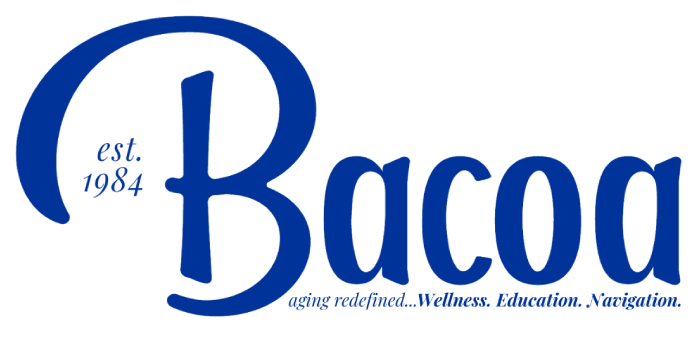Early Detection of Possible Dementia
Memory Screening
Some age-related memory changes are a normal part of the aging process. However, certain behaviors may be early warning signs of something more serious. If you are concerned about your or a loved one’s memory, we are here to help with early detection. Bacoa offers free, confidential memory screening to assess for possible dementia and those concerned about memory loss.
“Dementia is not a specific disease but is rather a general term for the impaired ability to remember, think, or make decisions that interferes with doing everyday activities. Alzheimer’s disease is the most common type of dementia. Though dementia mostly affects older adults, it is not a part of normal aging.”
Screenings take about a half hour, and in-person and Zoom appointments are available.
Call Bacoa at (847) 381-5030 to schedule an appointment.

PLEASE NOTE:
Screenings are not meant to diagnose but to identify any memory issues that can be further addressed with a physician.
A healthcare provider can perform tests on attention, memory, problem-solving, and other cognitive abilities to see if there is cause for concern. A physical exam, blood tests, and brain scans like a CT or MRI can help determine an underlying cause.
Planning for a Memory Screening
Because dementia is a general term, its symptoms can vary widely from person to person. However, some recognizable warning signs cause concern. A memory screening can offer peace of mind.
People with dementia have problems with:
Signs that may point to dementia include:
What are the most common types of dementia?
ALZHEIMER’S DISEASE
This is the most common cause of dementia, accounting for 60 to 80 percent of cases. It is caused by specific changes in the brain. The trademark symptom is trouble remembering recent events, such as a conversation that occurred minutes or hours ago, while difficulty remembering more distant memories occurs later in the disease.
VASCULAR DEMENTIA
About 10 percent of dementia cases are linked to strokes or other issues with blood flow to the brain. Diabetes, high blood pressure, and high cholesterol are also risk factors. Symptoms vary depending on the area and size of the brain impacted. The disease progresses stepwise, meaning symptoms will suddenly worsen as the individual has more strokes or mini-strokes.
LEWY BODY DEMENTIA
People with this form of dementia may have movement or balance problems like stiffness or trembling. Many people also experience changes in alertness, including daytime sleepiness, confusion, or staring spells. They may also have trouble sleeping at night or experience visual hallucinations (seeing people, objects, or shapes that are not actually there).
FRONTO-TEMPORAL DEMENTIA
This type of dementia most often leads to changes in personality and behavior because of the part of the brain it affects. People with this condition may embarrass themselves or behave inappropriately. For instance, a previously cautious person may make offensive comments and neglect responsibilities at home or work. There may also be problems with language skills like speaking or understanding.
MIXED DEMENTIA
Sometimes more than one type of dementia is present in the brain at the same time, especially in people aged 80 and older. For example, a person may have Alzheimer’s disease and vascular dementia. It is not always evident that a person has mixed dementia since the symptoms of one type of dementia may be most prominent or overlap with symptoms of another kind.
REVERSIBLE CAUSES
People with dementia may have reversible underlying causes such as medication side effects, increased brain pressure, vitamin deficiency, and thyroid hormone imbalance.

